Every morning, many humans wake up to the soothing sound of songbirds amidst verdant forests, confident that another sixteen hours of Earthly paradise await before returning to perfect, untroubled sleep. But what if that weren’t true? What if something unpleasant, perhaps even catastrophic, were waiting? Terrible news for the people about to have a very bad day. Excellent news for readers… as these five books prove.
The Andromeda Strain by Michael Crichton (1969)
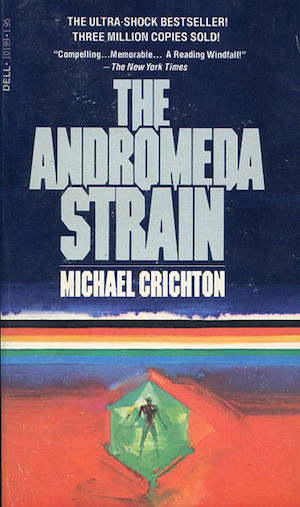
Piedmont, Arizona barely has enough residents to justify being a named location. The rural community is a rustic backwater, a peaceful town far from the mainstream of history. All this changes when the SCOOP capsule lands nearby. Finally, Piedmont will be important… as ground zero for what may be humanity’s doom.
Curious about the capsule’s contents, Dr Alan Benedict cracked open the satellite. Minutes later, almost every Piedmont resident was dead, a few lingering long enough to go mad. The only survivors are a fussy baby and an alcoholic old man. If scientists cannot discover what common element the two survivors share before winds carry the pathogen across North America, the entire human race may fall victim to the Andromeda Strain.
On the one hand, Dr. Benedict was an idiot. Even if SCOOP had not contained a lethal extraterrestrial pathogen, opening it would have contaminated the contents, potentially ruining the research. On the other hand, the proper authorities might have taken it to a considerably more populated region before popping it open to discover the highly unorthodox life-form that laughs at conventional containment methods. In the long run, the doctor may have saved millions of lives. Still an idiot, though.
A Wizard’s Henchman by Matthew Hughes (2016)
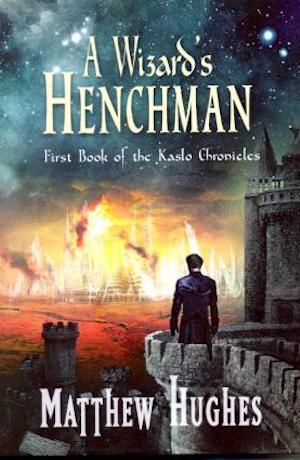
Erm Kaslo has made a very nice living for himself as an all-round troubleshooter for rich men. As long as Kaslo gets paid—and it is a very foolish person who tries to short Kaslo on wages owed—Kaslo is not overly particular about the nature of his employers or the peculiar beliefs said employers might hold.
Diomedo Obron believes the age of science will end, replaced by a new age of magic. Kaslo believes Obron can afford Kaslo’s steep fees. That other stuff is not Kaslo’s business. At least, not until Obron’s prediction comes true, leaving Kaslo the challenging task of surviving in a universe whose very laws have been transformed beyond recognition.
How well does galactic society deal with the end of the science on which so many lives depend? Not well at all. The galaxy becomes much emptier over a very short period of time. However, Kaslo is nothing if not adaptable.
The Deep Sky by Yume Kitasei (2023)
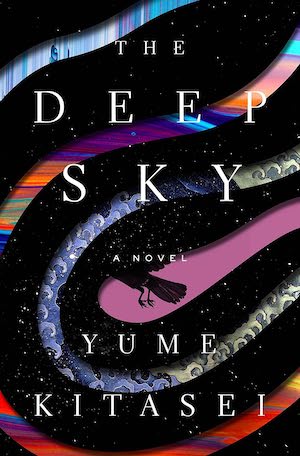
Refusing to be distracted by climate change-related disasters, oligarch Linda Trembling orchestrated the global effort to pour precious resources into the starship Phoenix. While Earth sleepwalks towards global war, Phoenix will convey its elite crew to the vaguely named Planet X.1 Who knows? Perhaps the colony will survive.
A decade into the voyage, crewpersons Asuka and Kat venture onto the hull to investigate a mysterious object. One bomb detonation later, Kat and two crewmembers inside Phoenix are dead. Asuka is drawn into an investigation to uncover the saboteur. If only there were not so many suspects. If only Asuka were as hypercompetent as her crewmates, rather than having obtained her position through a loophole….
Sabotage aside, various details in the novel suggest that the ship has been designed without much redundancy in vital systems. Perhaps to be expected in a project at the cutting edge of technology, helmed by an oligarch more concerned with ego than practicality. As yet, this is a standalone novel. Sequels could very well illustrate how not to colonize alien worlds.
These Lifeless Things by Premee Mohamed (2021)
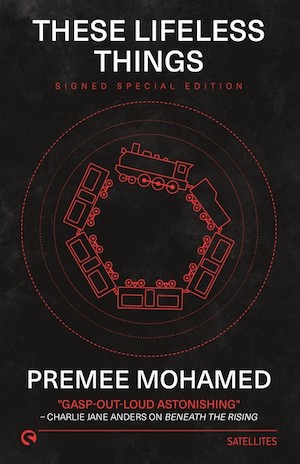
Fifty years after the Setback, researchers like Emerson find themselves frustratingly poorly informed about the calamity. The demographic consequences are obvious. Something caused the human population to swiftly decline from eight billion people to forty million. What that something was is curiously undocumented…until now, when Eve’s journal is uncovered.
Fifty years earlier, Eve survived the initial stages of human contact with Them. The intruder’s origin is unknown. Their nature is unclear. Their hostility and overwhelming superiority are evidenced by the carnage left in Their wake. Having lost almost everything, Eve cannot turn down a chance to strike back at the invaders, even if this amounts to suicide.
Humanity reduced to forty million people sounds bad, I know. However, that’s as many people as were around during Sumer’s heyday. It is far more humans than have been alive at any given time during most of the species’ existence. Forty million people is lots! …Unless you’re one of the eight billion who didn’t make it.
A Paradise Built in Hell by Rebecca Solnit (2009)
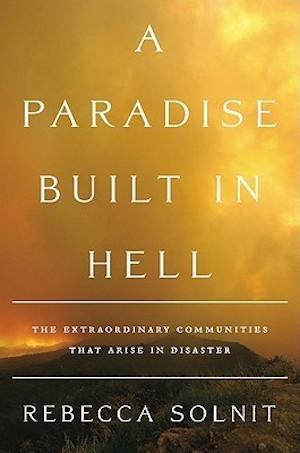
Speculative fiction being so very fond of catastrophe and enamored of certain specific plot-enabling tropes, it might be useful to step back and look at actual reality. In this non-fiction text, Solnit examines a sequence of catastrophes and their aftermath. What she discovers is that human nature under pressure is starkly different from that predicted by disaster fiction: Disaster does not produce Hobbesian war of all against all, but its opposite.
This raises the question of why so many words have been devoted to convincing people that society is one minor setback away from mass chaos and death. The text casts some light on that question as well. Readers might do well to consider who benefits from promoting those worldviews.2
***
Rapid-onset calamity being the handy plot-enabler that it is, it appears in a myriad of works. These are just five (one of which is non-fiction). No doubt some of you have your favorites unmentioned here. Feel free to make a case for them in comments, below.
In the words of fanfiction author Musty181, four-time Hugo finalist, prolific book reviewer, and perennial Darwin Award nominee James Davis Nicoll “looks like a default mii with glasses.” His work has appeared in Interzone, Publishers Weekly and Romantic Times as well as on his own websites, James Nicoll Reviews (where he is assisted by editor Karen Lofstrom and web person Adrienne L. Travis) and the 2021, 2022, and 2023 Aurora Award finalist Young People Read Old SFF (where he is assisted by web person Adrienne L. Travis). His Patreon can be found here.
[1]I feel like the marketing department did not earn their wages when devising that name (Planet X). At least it’s not Planety McPlanety.
[2]Well, people other than writers, since authors obviously benefit from the one-setback-and-we’re-all-doomed trope. It’s much easier to write a gripping story of survival as disrupted Malteser distribution pushes civilization toward nuclear war, civil disorder, and rampant Unitarianism than it is to write one where the power failed across a third of North America, inspiring people to race into the streets to helpfully direct traffic. (Disrupted Malteser distribution may only have happened in Wilmot, Ontario, back in the 1970s, but since that’s where I lived, it was important to *me.*)










